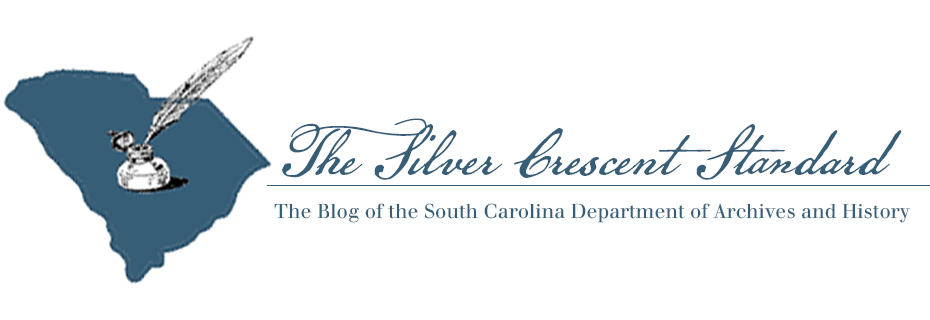
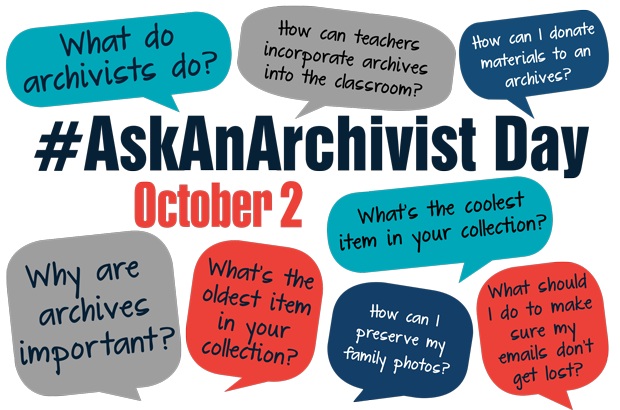
#AskAnArchivist Day is a day sponsored by the Society of American Archivists that is used as an opportunity to connect archivists directly with the public. As archivists, we often get asked “what is the oldest document you have?” or “why can’t you digitize everything?” To celebrate #AskAnArchivist Day we are answering some of the frequently asked questions we get at the South Carolina Department of Archives and History (SCDAH).
What do archivists do?
Here at the SCDAH, we have several different types of archivists. Reference Archivists work in the research room to help researchers and genealogists locate SCDAH materials both in person and online. Our Conservation Archivist is responsible for carrying out basic conservation treatments as needed for the items in our collection. This includes repairing documents that are torn or broken into pieces, surface cleaning and removing tapes and adhesives, mold treatment, and book binding and repair. Processing Archivists work to arrange physical records and describe them in our online catalog so the public can access them. Digitization Archivists scan records, write metadata, and help put them online. Lastly, some of our archivists work specifically with born-digital records like email and social media to ensure they are preserved. Regardless of different duties, all of the archivists here at the SCDAH work to make South Carolina government records accessible to the public and to preserve them for the future.
What types of records do you collect?
Most of what we collect are state and county government records. For state records, we have documents from different state agencies like minutes, accountability reports, public relations materials, photographs, military records, and a variety of other types of records. We also hold governor’s records dating back to 1695. In regards to county records, we have materials created by different county offices like the Register of Deeds, Probate Court, Court of General Sessions, Board of Education, etc. The SCDAH also holds some of South Carolina’s most important documents like the state constitutions from 1776-1895, the Ordinance of Secession, South Carolina’s copy of the Bill of Rights, and the Articles of agreement between the Lords Proprietors from 1674. To see what records we have in our collections you can view our Summary Guide. In addition to original records, we also have a reading room with secondary sources focused on a variety of different South Carolina History topics.
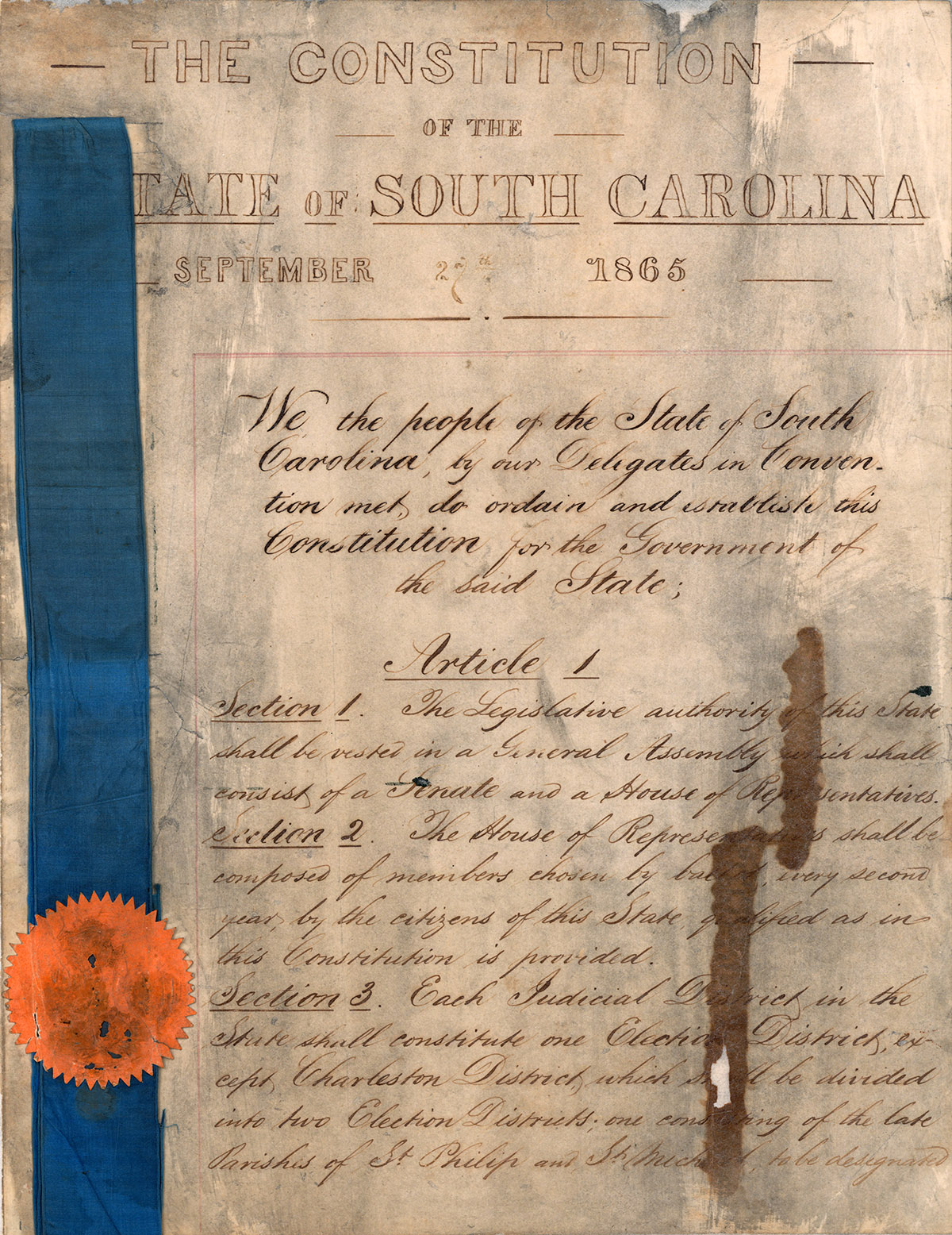
Why can’t you digitize everything & how do you decide what to digitize?
At SCDAH, we have over 30 million documents in our care. The short answer is that while we’d love to digitize everything, it simply isn’t possible given the sheer number of documents and the size of our staff. Despite that, our goal is to make the records of South Carolina more accessible to everyone, so we have several archivists that focus on digitization! There are several factors that go in to deciding what we digitize. For example, the highest priority records are usually those that get the most use in the reference room. We also try to digitize records that are more fragile than others, so that the original documents can stay tucked away as much as possible! Finally, we also digitize records upon request for researchers.
What is the oldest item in your collection?
Our oldest item dates back to 1671. This record book contains records of the Secretary of the Province and the Register of the Province from 1671-1675.
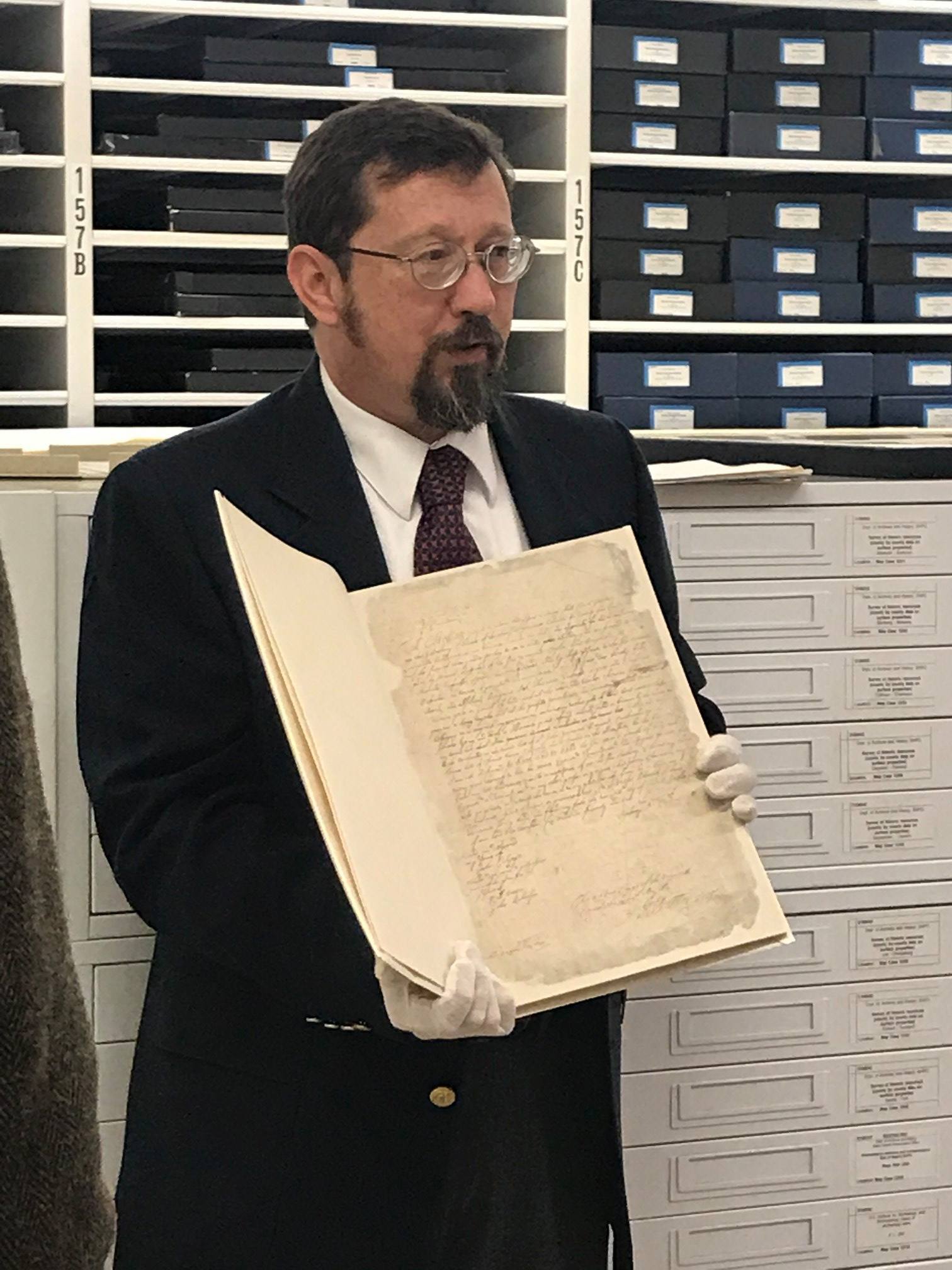
What records are required by law to be preserved?
South Carolina state law states that a “public record” includes all books, papers, maps, photographs, cards, tapes, recordings, or other documentary materials regardless of physical form or characteristics prepared, owned, used, in the possession of, or retained by a public body. A “Public body” is any department, board, commission, agency, authority, governmental body, or political subdivision of the State. South Carolina has records retention schedules that dictate what happens to records created by public bodies. Some records are deemed to have historical or archival value, which the law dictates must come to the SCDAH for permanent storage after they are no longer in use by the creators. Others are deemed non-permanent and may be destroyed according to the retention schedule. For more information visit the Records Management section of the SCDAH website.
How do you archive websites?
The SCDAH uses an automated web crawler operated by the Internet Archive to preserve state agency websites. The Internet Archive is a 501(c)(3) non-profit founded in 1996 with the purpose of offering permanent access to collections that exist in digital format. In fall of 2005, the Internet Archive began pilot testing their new subscription service, Archive-It, which allows institutions to build, manage and search their own unique web archives. The South Carolina Department of Archives and History began using Archive-It in 2007 to archive state agency websites. The South Carolina State Government Website Archives allows you to view South Carolina state agency websites from past dates, providing free and open access to the information long after the sites have changed on the live web. You can learn more about how to access these materials on our blog.
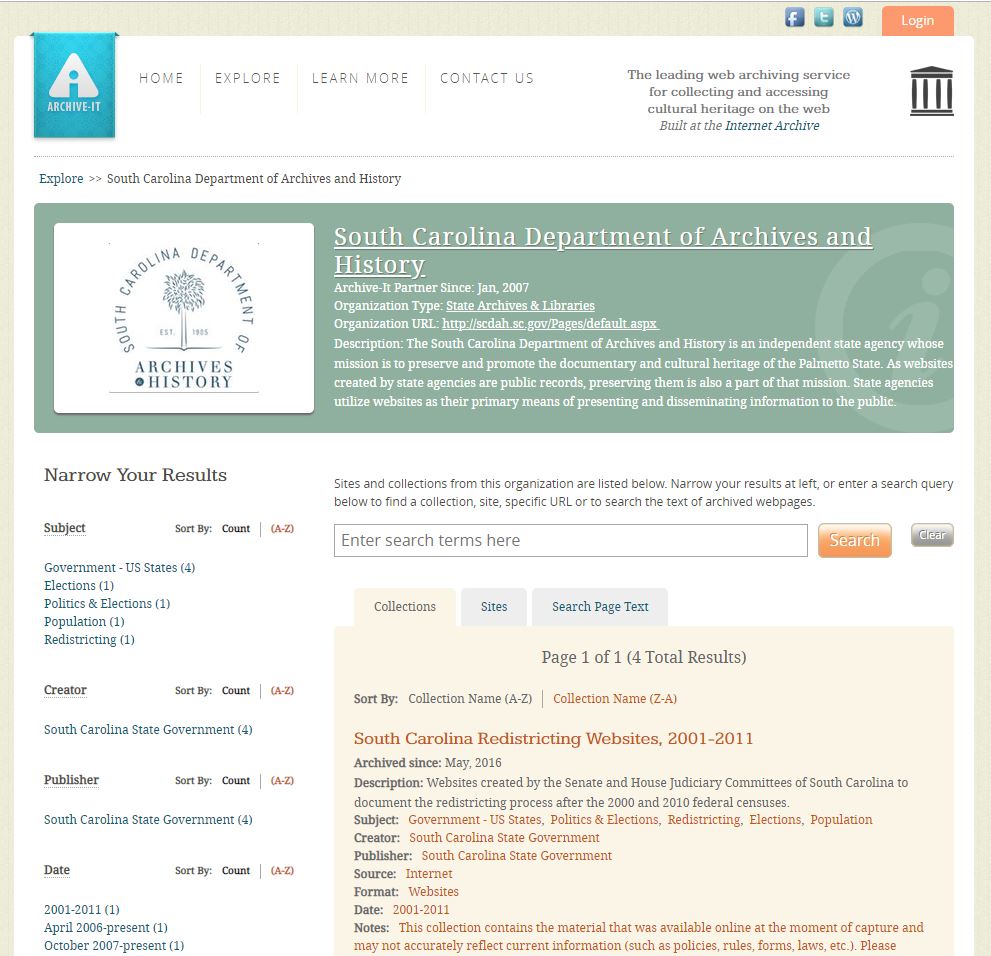
Do you have birth certificates?
We often get questions about more recent records that have not yet come to the Archives. One example of this is birth certificates. South Carolina did not require birth certificates until January 1, 1915. These records are held by the South Carolina Department of Health and Environmental Control (DHEC) and are closed for 100 years. The Archives has birth certificates for 1915, 1916, and 1917 available through the South Carolina Electronic Records Archive (SCERA). To obtain birth certificates after 1917 you must contact DHEC .
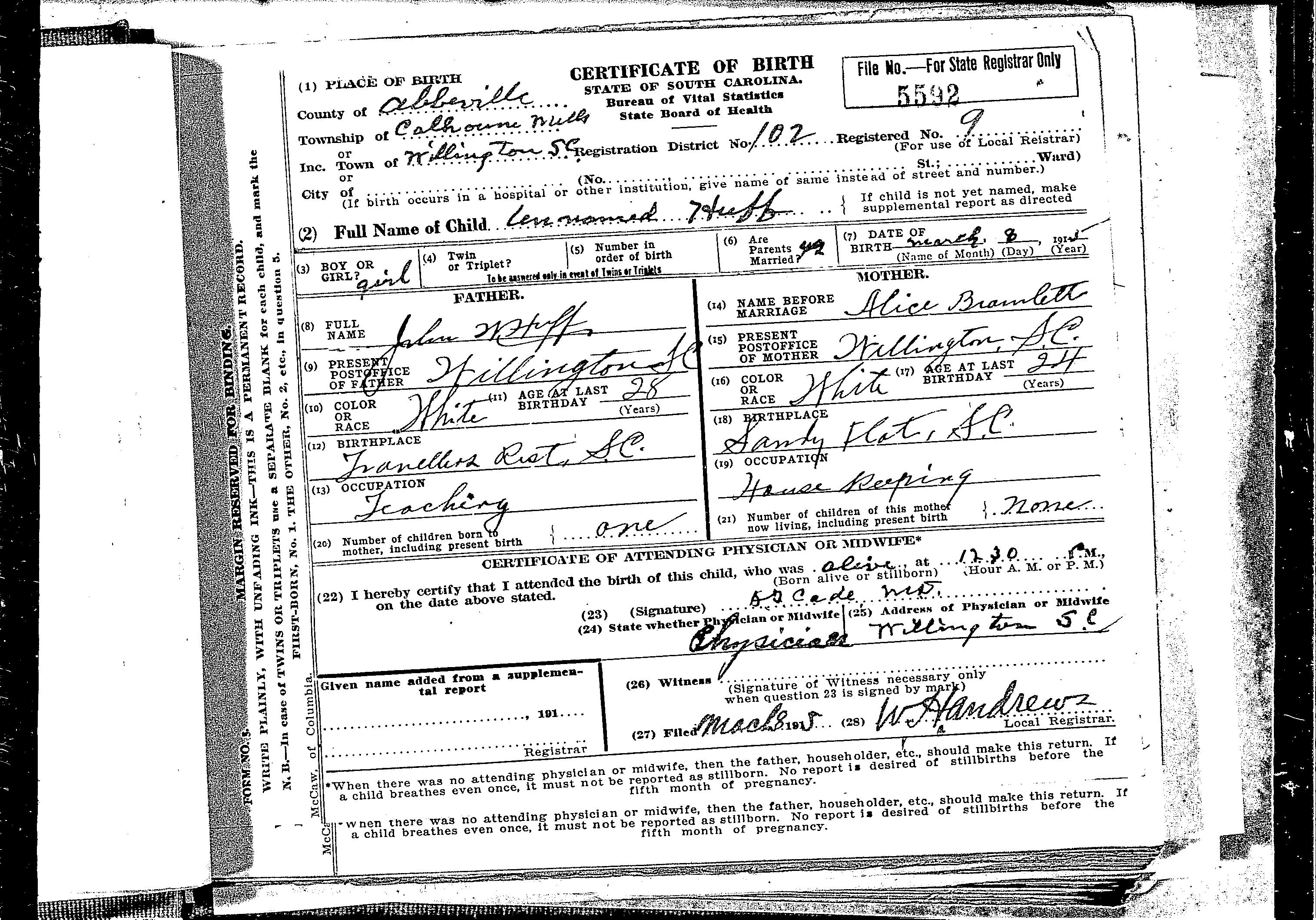
If you don’t have the record, who does?
Because our collecting scope focuses mostly on state and county government records, there are many records not housed here that can be important to your research. South Carolina has many different archival repositories in the state including university archives, local historical societies, museums, libraries, and a variety of other historical organizations. In addition to other archival repositories, some records have not yet made it to the Archives because they are too recent so they are still in the office of origin. The SCDAH is here to help researchers find items in our collections, but we can also help point you in the direction of the archival repository or government agency that might also be able to assist you!
We hope we answered some of your questions! Be sure to follow along on Twitter on October 2, 2019 using the hashtag #AskAnArchivist! You can follow the SCDAH on Twitter using the handle @SCArchives.
